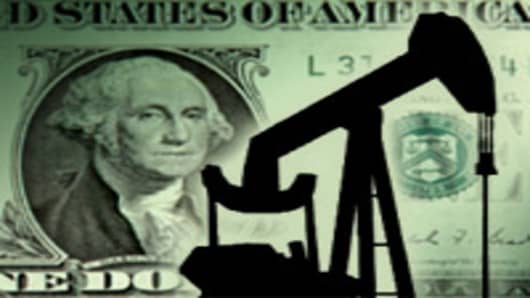Record high oil prices have deepened economic pain and even energy producers have begun to fret, but at talks with their customers in Rome they blamed the U.S. dollar and said they could not halt the rally.
Speaking after oil hit yet another record above $117 a barrel on Monday, the IMF's John Lipsky told Reuters the price was one of many factors eating into economic growth.
"It's dampening growth -- that's for sure, but of course it is benefiting exporters."
Lipsky, the No. 2 official at global watchdog the International Monetary Fund (IMF), was arriving for talks between energy producers and consumers that continue until Tuesday.
Representatives of both sides have said the risk is prices will go higher still and although the United States has led calls for more oil to calm markets, OPEC oil ministers have repeatedly said that would make no difference.
They say the problem is nothing to do with short-term supply.
Rather, it is a result of a weak U.S. dollar that has hit record lows against major currencies in response to a faltering U.S. economy.
"We think the price that we are seeing is a consequence of the devaluation of the dollar," Venezuelan Energy and Mines Minister Rafael Ramirez told Reuters.
"The devaluation has caused terrible consequences for the world economy and for food prices."
No Shortage of Oil
Echoing comments by other members of the Organization of the Petroleum Exporting Countries (OPEC) attending the Rome talks, he said OPEC could not bring down the price by pumping more because there was already enough oil in the market.
The IMF's latest World Economic Outlook earlier this month put its world growth forecast at 3.7 percent this year, down from a growth forecast in January of 4.1 percent.
It has predicted the U.S. economy would enter a modest recession in 2008 and start gradually to recover in 2009.
Growth expectations were based on assumptions of an oil price of $95.50 for 2008 and $94.50 in 2009, well below the record of $117.40 for U.S. crude hit on Monday.
Financial markets have been in turmoil for months in a crisis triggered by U.S. bad debt and a sliding housing market.
Many analysts say the problems have helped to spur a wave of buying in oil and other dollar-denominated commodities, as investors seek an inflation hedge.
The rise of gasoline prices in the United States to more than $3 a gallon has eroded customer demand and spending power.
But those suffering most are the poor nations, said the chief economist of the International Energy Agency, representative of energy consumer nations, adding the impact on the poorest was among the themes of the International Energy Forum (IEF) talks in Rome.
"Of course there is an impact on the economy. .... The greatest impact is on poor, oil importing countries," he said, citing oil importers in Africa.
The outgoing prime minister of host nation Italy said every $10 a barrel increase in the oil price cost the global economy $500 billion and warned there was a risk to world peace.
"We should avoid the risk that energy becomes the reason for tension and conflicts between various regions of the world in the future, in which case we all will be losing," Romano Prodi said in a speech.
Oil exporting countries have enjoyed record revenues, but they are not immune to inflationary pressures and could be at threat from lower demand and increased use of alternative fuel.
They have also voiced concern about the rising costs of bringing on new oil as an overall surge in commodity prices and labor shortages have hampered exploration and production.
"No, I'm not enjoying the high price," said Qatari Oil Minister Abdullah al-Attiyah, but he added "I'm enjoying the challenge of the business."


